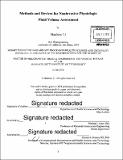Methods and devices for noninvasive physiologic fluid volume assessment
Author(s)
Li, Matthew, Ph. D. Massachusetts Institute of Technology
DownloadFull printable version (17.85Mb)
Other Contributors
Harvard--MIT Program in Health Sciences and Technology.
Advisor
Michael J. Cima.
Terms of use
Metadata
Show full item recordAbstract
Fluid volume status is a physiologic parameter that currently lacks a reliable diagnostic tool. Volume control becomes an issue during sickness and/or stress (physical and mental) in a wide range of populations. Unfortunately, current diagnostics suffer from being imprecise, invasive, and/or easily confounded and cannot unambiguously and practically inform volume status. There exists a need for a tool that can inform individuals and clinicians of fluid status in a noninvasive, rapid, and reliable manner. Drawing on the molecular sensitivity of IH nuclear magnetic resonance (NMR), we explored the ability of NMR methods to quantitate physiologic fluid volume changes. We first proved that NMR methods could detect volume changes in an animal model of dehydration. Correlation between NMR value changes in specific tissues and clinical tools used to assess dehydration validate NMR as a viable tool. We then proceeded to design and fabricate practical NMR sensors that could be easily integrated into the clinic. New methods of magnetic instrument design optimized for both field strength and spatial resolution were developed resulting in compact device prototypes with signal fidelity rivaling those of impractical commercial systems. Finally, we explored the ability of these devices to detect intravascular fluid changes during hemodialysis. Our methods and devices were able to detect intravascular blood property changes associated with blood dilution, in addition to overall fluid volume changes due to hemodialysis therapy. These results, methods, and devices provide the foundation and framework for the integration of NMR-based personalized fluid volume assessment into standard clinical practice.
Description
Thesis: Ph. D. in Medical Engineering and Medical Physics, Harvard-MIT Program in Health Sciences and Technology, 2016. "June 2016." Cataloged from PDF version of thesis. Includes bibliographical references (pages 131-154).
Date issued
2016Department
Harvard University--MIT Division of Health Sciences and TechnologyPublisher
Massachusetts Institute of Technology
Keywords
Harvard--MIT Program in Health Sciences and Technology.